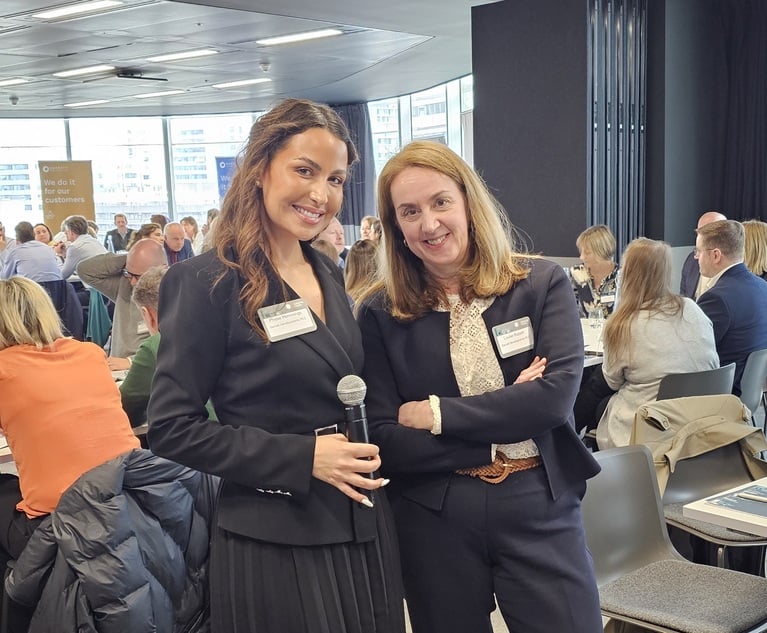'We didn't buy Carillion to do a Freshfields' – CC's new London head on ramping up Newcastle and creating the firm of the future
Michael Bates on his 'baptism of fire' since taking up the leadership reins in CC's London HQ
June 07, 2018 at 06:33 AM
7 minute read
 Clifford Chance's (CC's) recently appointed London head Michael Bates is not exaggerating when he describes his first few weeks in the job as a "baptism of fire". Within three weeks of taking up his new post in January, he was in negotiations to purchase the legal services arm of collapsed construction giant Carillion.
Clifford Chance's (CC's) recently appointed London head Michael Bates is not exaggerating when he describes his first few weeks in the job as a "baptism of fire". Within three weeks of taking up his new post in January, he was in negotiations to purchase the legal services arm of collapsed construction giant Carillion.
Thirteen days later, on Valentine's Day, he toasted sealing the deal to buy Carillion Advice Service (CAS) with M&A partner Melissa Fogarty and a bottle of champagne on the train back from Newcastle.
The deal means that in addition to a legal services centre in India, the firm is now the owner of a more than 60-strong paralegal business in the northeast.
It was, says Bates, a "good way of testing how much autonomy I have in the job – of seeing where the boundaries are".
Buying the business out of insolvency involved dealing with a lot of unknowns, despite CC's prior experience of CAS as a client. Staff costs, holiday entitlement, bonus details and accurate turnover figures were all hard to find.
Says Bates: "There was no time for due diligence – it was a bit like taking a punt, but we'd used them in our work and had been impressed as a client and knew their management team a little bit."
CC's management committee then gave Bates the validation to go for it.
"When you're new to the job and presenting to an established leadership group, it was a vote of confidence by them in me and in the proposition."
Faced with two weeks to find new IT for the entire office, and a lease that was due to expire at the end of March, the CAS team officially started taking on CC work at the beginning of April.
Since then, Bates has had to put a temporary brake on its managed legal services work for other law firms, to meet internal demand.
The Newcastle centre is already carrying out Brexit-related work for clients, rewriting derivatives contracts for financial institution clients, in addition to due diligence matters.
It is also still carrying out three external contracts, though it lost a bid to retain work for a legal aid contract when the business transferred from Carillion to CC – a loss that Bates says will free up 10 of the team's paralegals to work on CC matters instead.
The focus now is very much on expansion to meet client and internal demand, with Bates planning to grow the centre, led on the ground by Lucy Nixon and Charlotte Cale, to closer to 85 paralegals by September – an increase of more than 30%.
"In the short term, our number one priority is to integrate the team into CC and we've asked them to recruit. When it's the right size we can look again at managed services."
In its current space, CC has room to house up to 140 staff in Newcastle, with Bates all too aware that this space had once been occupied by the CAS team, which saw a steady decline in headcount during the months leading up to Carillion's collapse.
If you need due diligence on an M&A deal, do you get expensive lawyers in London or do you send it to Newcastle?
Over time, Bates wants to see Newcastle expand to house a broader range of roles, including potentially, qualified lawyers. In the near term, this could mean rethinking where the firm houses new recruits to its own internal, non-fee earning, legal team; in the future it could mean having, say, qualified real estate lawyers in Newcastle.
"At the moment the office is all paralegals," says Bates. "In 10 years' time, it could be an awful lot more. Eventually I'd like to see some qualified lawyers there.
"In every firm there are some manually-intensive sections of work that it doesn't make sense to do in London with an expensive London lawyer. It's about unbundling those processes, taking that work out and plugging the results back into a combined offering to the client. If you need due diligence on an M&A deal, do you get expensive lawyers in London or do you send it to Newcastle?"
What Bates is adamant about, is that Newcastle is not about downsizing London, or India, where the firm has roughly 400 people working across its support-focused global shared service centre and its legal support centre. As a consequence, he is not predicting that it will grow to the size of Freshfields' Manchester back office and legal support centre, which already houses some 700 people.
"We bought Carillion for the paralegal team – we didn't buy it to do a Freshfields," he maintains. "It isn't about downsizing London."
Nor it is just about the paralegals. The Carillion team had been working with AI provider Luminance for some time, making it a good base for legal tech development too.
"Newcastle isn't just about costs. They're also further down the line in the adoption of legal tech than London is – they've been feeding the AI machine for longer. The days of doing everything under one roof disappeared a while ago, now it's about how we address the challenges going forward," says Bates.
There's been a 'them and us' divide between fee earners and business services, but the law firm of the future won't have that
This tech element ties in with another part of Bates's focus – the firm's new best delivery hubs, which bring together legal project managers, legal tech development advisers, resourcing managers and continuous improvement experts across open-plan areas in three floors of the firm's London office.
"Newcastle, the best delivery initiative; it's all about creating the firm of the future by bringing everything together. In the past there's been a 'them and us' divide between business services and fee earners, but the law firm of the future won't have that divide," he explains.
Diversity also features high on his agenda. Fresh from finalising the Carillion deal within his first month, Bates then made the decision to include partner figures in the firm's gender pay gap reporting in March, prompting other firms to restate their own figures to do the same.
"We've been pushing diversity for a while but I felt we needed to turbocharge it. If the purpose of the legislation is to drive change, then it isn't just about what the legislation says – I thought we should take a step back and think about what it's really trying to achieve."
Since then, he has also managed to carry out a workplace culture survey and and form a working group to roll out a number of initiatives to boost diversity.
Six months in and with no sign of slowing down, it looks like Bates is a long way from finding the 'boundaries' of his role, and that partners are more than willing to listen to his plans.
This content has been archived. It is available through our partners, LexisNexis® and Bloomberg Law.
To view this content, please continue to their sites.
Not a Lexis Subscriber?
Subscribe Now
Not a Bloomberg Law Subscriber?
Subscribe Now
NOT FOR REPRINT
© 2025 ALM Global, LLC, All Rights Reserved. Request academic re-use from www.copyright.com. All other uses, submit a request to [email protected]. For more information visit Asset & Logo Licensing.
You Might Like
View All
Broadcom Hires From Nuclear Giant to Appoint French Legal Head

GCs Say They are Getting 'Edged Out' of UK Boardrooms

'I Won’t Name the Firm, But...'—Barratt Redrow's Legal Head on External Counsel Red Flags
Trending Stories
- 1Tensions Run High at Final Hearing Before Manhattan Congestion Pricing Takes Effect
- 2Improper Removal to Fed. Court Leads to $100K Bill for Blue Cross Blue Shield
- 3Michael Halpern, Beloved Key West Attorney, Dies at 72
- 4Burr & Forman, Smith Gambrell & Russell Promote More to Partner This Year
- 5Sanctions Order Over Toyota's Failure to Provide English Translations of Documents Vacated by Appeals Court
Who Got The Work
Michael G. Bongiorno, Andrew Scott Dulberg and Elizabeth E. Driscoll from Wilmer Cutler Pickering Hale and Dorr have stepped in to represent Symbotic Inc., an A.I.-enabled technology platform that focuses on increasing supply chain efficiency, and other defendants in a pending shareholder derivative lawsuit. The case, filed Oct. 2 in Massachusetts District Court by the Brown Law Firm on behalf of Stephen Austen, accuses certain officers and directors of misleading investors in regard to Symbotic's potential for margin growth by failing to disclose that the company was not equipped to timely deploy its systems or manage expenses through project delays. The case, assigned to U.S. District Judge Nathaniel M. Gorton, is 1:24-cv-12522, Austen v. Cohen et al.
Who Got The Work
Edmund Polubinski and Marie Killmond of Davis Polk & Wardwell have entered appearances for data platform software development company MongoDB and other defendants in a pending shareholder derivative lawsuit. The action, filed Oct. 7 in New York Southern District Court by the Brown Law Firm, accuses the company's directors and/or officers of falsely expressing confidence in the company’s restructuring of its sales incentive plan and downplaying the severity of decreases in its upfront commitments. The case is 1:24-cv-07594, Roy v. Ittycheria et al.
Who Got The Work
Amy O. Bruchs and Kurt F. Ellison of Michael Best & Friedrich have entered appearances for Epic Systems Corp. in a pending employment discrimination lawsuit. The suit was filed Sept. 7 in Wisconsin Western District Court by Levine Eisberner LLC and Siri & Glimstad on behalf of a project manager who claims that he was wrongfully terminated after applying for a religious exemption to the defendant's COVID-19 vaccine mandate. The case, assigned to U.S. Magistrate Judge Anita Marie Boor, is 3:24-cv-00630, Secker, Nathan v. Epic Systems Corporation.
Who Got The Work
David X. Sullivan, Thomas J. Finn and Gregory A. Hall from McCarter & English have entered appearances for Sunrun Installation Services in a pending civil rights lawsuit. The complaint was filed Sept. 4 in Connecticut District Court by attorney Robert M. Berke on behalf of former employee George Edward Steins, who was arrested and charged with employing an unregistered home improvement salesperson. The complaint alleges that had Sunrun informed the Connecticut Department of Consumer Protection that the plaintiff's employment had ended in 2017 and that he no longer held Sunrun's home improvement contractor license, he would not have been hit with charges, which were dismissed in May 2024. The case, assigned to U.S. District Judge Jeffrey A. Meyer, is 3:24-cv-01423, Steins v. Sunrun, Inc. et al.
Who Got The Work
Greenberg Traurig shareholder Joshua L. Raskin has entered an appearance for boohoo.com UK Ltd. in a pending patent infringement lawsuit. The suit, filed Sept. 3 in Texas Eastern District Court by Rozier Hardt McDonough on behalf of Alto Dynamics, asserts five patents related to an online shopping platform. The case, assigned to U.S. District Judge Rodney Gilstrap, is 2:24-cv-00719, Alto Dynamics, LLC v. boohoo.com UK Limited.
Featured Firms
Law Offices of Gary Martin Hays & Associates, P.C.
(470) 294-1674
Law Offices of Mark E. Salomone
(857) 444-6468
Smith & Hassler
(713) 739-1250







